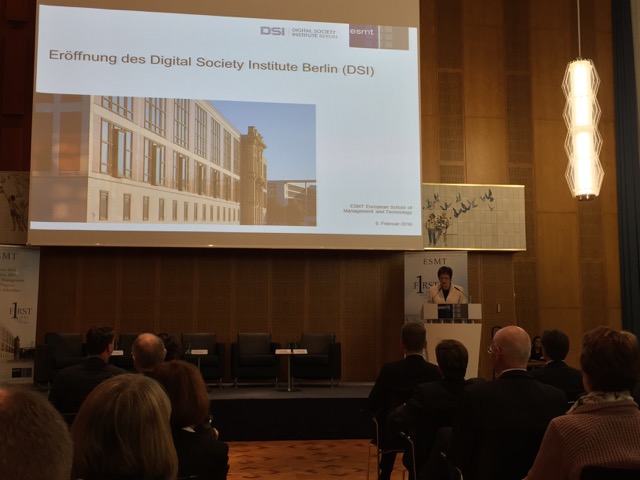Let’s imagine the following setting: a big, rather dark conference room, crowded with a curious and interested audience.
Estimate of average-age in the audience: 50
Estimate of women in the audience: 10%
Estimate of people wearing black suits: 95%
“Let’s be honest, you don’t look like you’re actually celebrating a big moment here,” Cherno Jobatey, TV journalist and host of the opening of the first Digital Society Institute Berlin, asks the audience to cheer.
On stage, speakers from BASF, Volkswagen, EY, Allianz, the Federal Government, the Foreign Office, NATO, and the Munich Security Conference devote themselves to analysing the often quoted “chances and challenges of digitalisation”.
Erste Podiumsdiskussion bei der Eröffnung des Digital Society Institute #DSI – finde den Fehler… pic.twitter.com/3eu7a9aIIB
— brigitte zypries (@brigittezypries) February 8, 2016
Zweite Diskussionsrunde bei der Eröffnung des #DSI– der Fehler ist derselbe. pic.twitter.com/XB3rW61I3y
— brigitte zypries (@brigittezypries) February 8, 2016
The experts agree that digitalisation challenges all spheres of life: Economy, society, politics, communication, infrastructure. The corporate representatives on stage say that they want to adapt to digitalisation but admit that the old economy is very careful when it comes to digital change. Globalisation and digitalisation stimulate and presuppose each other. Information is spread across the globe at the speed of light. The image of digitalisation, that the speakers create, sounds very much like a horror scenario. This German Angst of the possibility of an adventurous risk gone wrong paralyses decision makers. Dr Sandro Gaycken, Director of the Digital Society Institute, describes digitalisation as a wave that overruns the people, that turns them into reactive bystanders.
How do we change this? What’s the best way to go about digitalisation?
We don’t need to replicate Silicon Valley in Germany. Let’s have a look at their system, analyse our own strengths and develop something new. We need to be open to new technological developments and not let risks prevent us from trying. We must connect cities like Berlin, Munich, Hamburg, Cologne, and the often-underestimated Darmstadt, that are very strongly supporting startups. And most importantly, get connected with those that think differently. The opening of the Digital Society Institute Berlin is a good approach, but we missed the real digital society this evening. Get connected with IT specialists that develop new software solutions, with startup founders that believe in the success of their idea, and with digital natives that see the potential of digitalisation and that love to explore new tools.
